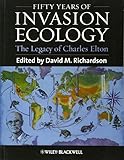Fifty years of invasion ecology: the legacy of Charles Elton / edited by David M. Richardson
Richardson, David M [editor].
Tipo de material: Libro
impreso(a)
Editor: United Kingdom: John Wiley and Sons, 2011Descripción: xix, 432 páginas : fotografías, retratos ; 25 centímetros.ISBN: 1444335863; 9781444335866.Tema(s): Elton, Charles S. (Científico) | Invasiones biológicas
Libro
impreso(a)
Editor: United Kingdom: John Wiley and Sons, 2011Descripción: xix, 432 páginas : fotografías, retratos ; 25 centímetros.ISBN: 1444335863; 9781444335866.Tema(s): Elton, Charles S. (Científico) | Invasiones biológicas| Tipo de ítem | Biblioteca actual | Colección | Signatura | Estado | Fecha de vencimiento | Código de barras |
|---|---|---|---|---|---|---|
| Libros |
Biblioteca Tapachula
Texto colocado en la configuración de la biblioteca Tapachula |
Acervo General | 577.18 F5 | Disponible | ECO020012724 |
Incluye bibliografía e índice
Contributors.. Foreword.. Introduction.. PART 1 HISTORICAL PERSPECTIVES.. 1 A world of thought: 'The Ecology of Invasions by Animals and Plants' and Charles Elton's life's work.. 2 Charles Elton: neither founder nor siren, but prophet.. 3 The inviolate sea? Charles Elton and biological invasions in the world's oceans.. 4 The rise and fall of biotic nativeness: a historical perspective.. PART 2 EVOLUTION AND CURRENT DIMENSIONS OF INVASION ECOLOGY.. 5 Patterns and rate of growth of studies in invasion ecology.. 6 Invasion ecology and restoration ecology: parallel evolution in two fi elds of endeavour.. PART 3 NEW TAKES ON INVASION PATTERNS.. 7 Biological invasions in Europe 50 years after Elton: time to sound the ALARM.. 8 Fifty years of tree pest and pathogen invasions, increasingly threatening world forests.. PART 4 THE NUTS AND BOLTS OF INVASION ECOLOGY.. 9 A movement ecology approach to study seed dispersal and plant invasion: an overview and application of seed dispersal by fruit bats.. 10 Biodiversity as a bulwark against invasion: conceptual threads since.. 11 Soil biota and plant invasions: biogeographical effects on plant-microbe interactions.. 12 Mutualisms: key drivers of invasions. Key casualties of invasions.. 13 Fifty years on: confronting Elton's hypotheses about invasion success with data from exotic birds.. 14 Is rapid adaptive evolution important in successful invasions?.. 15 Why reproductive systems matter for the invasion biology of plants.. 16 Impacts of biological invasions on freshwater ecosystems.. 17 Expanding the propagule pressure concept to understand the impact of biological invasions.. PART 5 POSTER-CHILD INVADERS, THEN AND NOW.. 18 Elton's insights into the ecology of ant invasions: lessons learned and lessons still to be learned.. 19 Fifty years of 'Waging war on cheatgrass': research advances, while meaningful control languishes
PART 6 NEW DIRECTIONS AND TECHNOLOGIES, NEW CHALLENGES.. 20 Researching invasive species 50 years after Elton: a cautionary tale.. 21 Invasions and ecosystems: vulnerabilities and the contribution of new technologies.. 22 DNA barcoding of invasive species.. 23 Biosecurity: the changing face of invasion biology.. 24 Elton and the economics of biological invasions.. 25 Modelling spread in invasion ecology: a synthesis.. 26 Responses of invasive species to a changing climate and atmosphere.. 27 Conceptual clarity, scientifi c rigour and 'The Stories We Are': engaging with two challenges to the objectivity of invasion biology.. 28 Changing perspectives on managing biological invasions: insights from South Africa and the Working for Water programme.. PART 7 CONCLUSIONS.. 29 Invasion science: the roads travelled and the roads ahead.. 30 A compendium of essential concepts and terminology in invasion ecology.. Taxonomic Index.. General Index
Invasion ecology is the study of the causes and consequences of the introduction of organisms to areas outside their native range. Interest in this field has exploded in the past few decades. Explaining why and how organisms are moved around the world, how and why some become established and invade, and how best to manage invasive species in the face of global change are all crucial issues that interest biogeographers, ecologists and environmental managers in all parts of the world. This book brings together the insights of more than 50 authors to examine the origins, foundations, current dimensions and potential trajectories of invasion ecology. It revisits key tenets of the foundations of invasion ecology, including contributions of pioneering naturalists of the 19th century, including Charles Darwin and British ecologist Charles Elton, whose 1958 monograph on invasive species is widely acknowledged as having focussed scientific attention on biological invasions. eng
